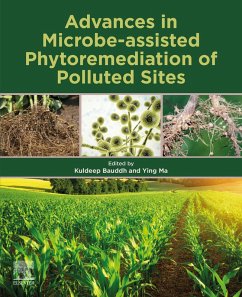Advances in Microbe-assisted Phytoremediation of Polluted Sites provides a comprehensive overview of the use of phytoremediation to decontaminate polluted land through microbial enhanced phytoremediation, including the use of plants with respect to ecological and environmental science. The book discusses the potential of microbial-assisted phytoremediation of the contaminant, including heavy metals, pesticides, polyaromatic hydrocarbons, etc., with case studies as examples. Key subjects covered include plant-microbe interaction in contaminated ecosystems, microbe-augmented phytoremediation for improved ecosystem services, and success stories on microbe-assisted phytoremediation of contaminated sites.
With increasing demand for land-space for social, industrial and agricultural use, the theoretical millions of hectares of contaminated sites around the world are a resource sorely needed that currently cannot be utilized. Decontamination of this land using ecologically-sound methods is paramount not only to land use, but in the prevention of toxic substances deteriorating local ecosystems by reducing productivity and contaminating the food chain - which can eventually aggregate in food chains and pose the potential risk of non-curable diseases to humans such as cancer.
With increasing demand for land-space for social, industrial and agricultural use, the theoretical millions of hectares of contaminated sites around the world are a resource sorely needed that currently cannot be utilized. Decontamination of this land using ecologically-sound methods is paramount not only to land use, but in the prevention of toxic substances deteriorating local ecosystems by reducing productivity and contaminating the food chain - which can eventually aggregate in food chains and pose the potential risk of non-curable diseases to humans such as cancer.
- Provides novel information on the potential for microbial inoculants to be used in phytoremediation
- Discusses principles and mechanisms of plant-microbe interaction for enhanced phytoremediation with improved soil health
- Investigates phytoremediation solutions for a multitude of contaminants, including heavy metals, fly ash, petroleum, arsenic, TPH, mining effluents, fluoride, lead and other major pollutants
Dieser Download kann aus rechtlichen Gründen nur mit Rechnungsadresse in A, B, BG, CY, CZ, D, DK, EW, E, FIN, F, GR, HR, H, IRL, I, LT, L, LR, M, NL, PL, P, R, S, SLO, SK ausgeliefert werden.


